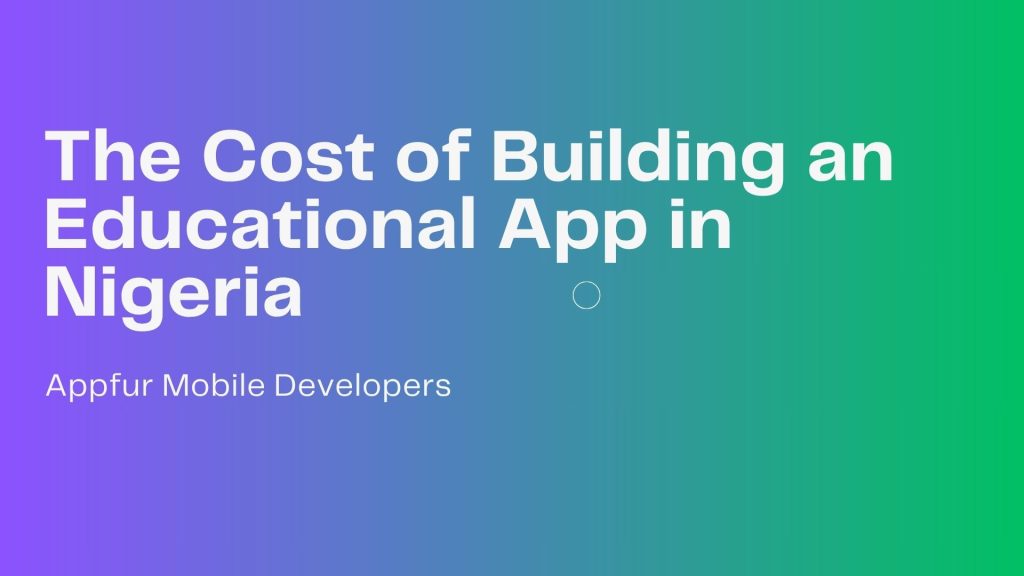Did you know that Nigeria’s e-learning market is projected to reach ₦150 billion by 2026? With millions of students, professionals, and educators embracing mobile learning, the demand for educational apps in Nigeria has never been higher.
Whether you’re an edtech startup, a school, or a private tutor looking to scale digitally, one key question comes up fast:
How much does it cost to build an educational app in Nigeria?
Let’s break it down for you.

1. What Kind of Educational App Are You Building?
Not all educational apps are created equal, and the type you choose to build significantly influences the development cost. Common categories include:
- Online course platforms (like Udemy or Coursera)
- Exam preparation apps (like JAMB, WAEC, IELTS practice apps)
- Learning management systems (LMS) for schools and universities
- Tutoring apps for one-on-one lessons or live classes
- Kids’ learning apps with games, audio, and visuals
- Corporate training platforms for skill development
Each type comes with its own complexity, features, and infrastructure, which all affect pricing.
2. Must-Have Features for Educational Apps in Nigeria
To succeed in Nigeria’s edtech market, your app needs to work well under local conditions (such as low bandwidth or unstable internet) while offering value-packed features. Some core features include:
- User registration/login
- Video and audio course delivery (live or pre-recorded)
- Downloadable content for offline access
- Progress tracking and quizzes
- Push notifications
- In-app purchases or subscription model
- Admin dashboard for instructors and school owners
- Multi-device support (especially Android-first)
The more features you add, the higher the development cost—but skipping key functionality could result in low adoption and poor retention.
3. Design and User Experience: Why It Matters in Nigeria
Most users in Nigeria access apps via budget to mid-range Android smartphones. This means your app must:
- Be lightweight and fast-loading
- Work offline or with weak internet
- Be intuitive for first-time users
- Have localized content or multiple language support (e.g., English, Yoruba, Hausa, Igbo)
Investing in a clean, functional user interface (UI) and a user-friendly experience (UX) increases app usage and reduces support requests.
4. Development Cost Breakdown in the Nigerian Market
Here’s a general breakdown of what it may cost to build an educational app in Nigeria (based on whether you choose freelancers, a local agency, or an international firm):
- Basic Educational App (MVP): ₦4 million – ₦7 million
- Features: Course videos, quizzes, user login, basic dashboard
- Standard Learning App: ₦8 million – ₦15 million
- Features: Live classes, progress tracking, payments, downloads, push notifications
- Advanced Platform (LMS or multi-instructor model): ₦18 million – ₦30 million+
- Features: Full video library, monetization system, analytics, mobile + web apps, backend admin panel
Please note: These costs can vary depending on app complexity, team experience, timelines, and scalability goals.
5. Choosing the Right Development Partner
The cost of development also depends on who builds your app:
- Freelancers are cheaper but may lack structure and post-launch support.
- In-house teams are great for long-term projects but expensive to maintain.
- Professional agencies like Appfur give you end-to-end support—from planning to launch and maintenance—at a flexible budget.
At Appfur, we specialize in building educational apps tailored to Nigeria’s unique market needs. We know what works and what doesn’t—from UI design to server scaling and mobile optimization.
6. Hidden Costs You Should Budget For
Beyond the core development, don’t forget about these essential post-launch costs:
- Cloud hosting (AWS, DigitalOcean, etc.)
- SMS/email integrations
- Content storage (especially if you’re hosting videos)
- Regular updates and bug fixes
- Digital marketing (to attract students)
- Customer support infrastructure
- Maintenance and scalability upgrades
A successful edtech app is not just built once—it’s continuously improved.
Final Thoughts
Building an educational app in Nigeria is a smart investment—but only when it’s done with clear goals, the right feature set, and a reliable development partner.
Whether you’re starting small with an MVP or planning a large-scale platform, understanding your cost structure upfront saves you time, money, and unnecessary frustration.
At Appfur, we help Nigerian schools, tutors, and edtech startups turn their vision into scalable, user-friendly educational apps. With a local-first mindset and a world-class team, we’ll guide you every step of the way.
Need help estimating your educational app budget?
Get a free consultation at www.appfur.com.ng — or request a detailed quote tailored to your idea.
We design and build high-quality, scalable mobile apps tailored to your needs.
Let’s talk! Message us on WhatsApp now: Click Here
Your next big app starts here!
